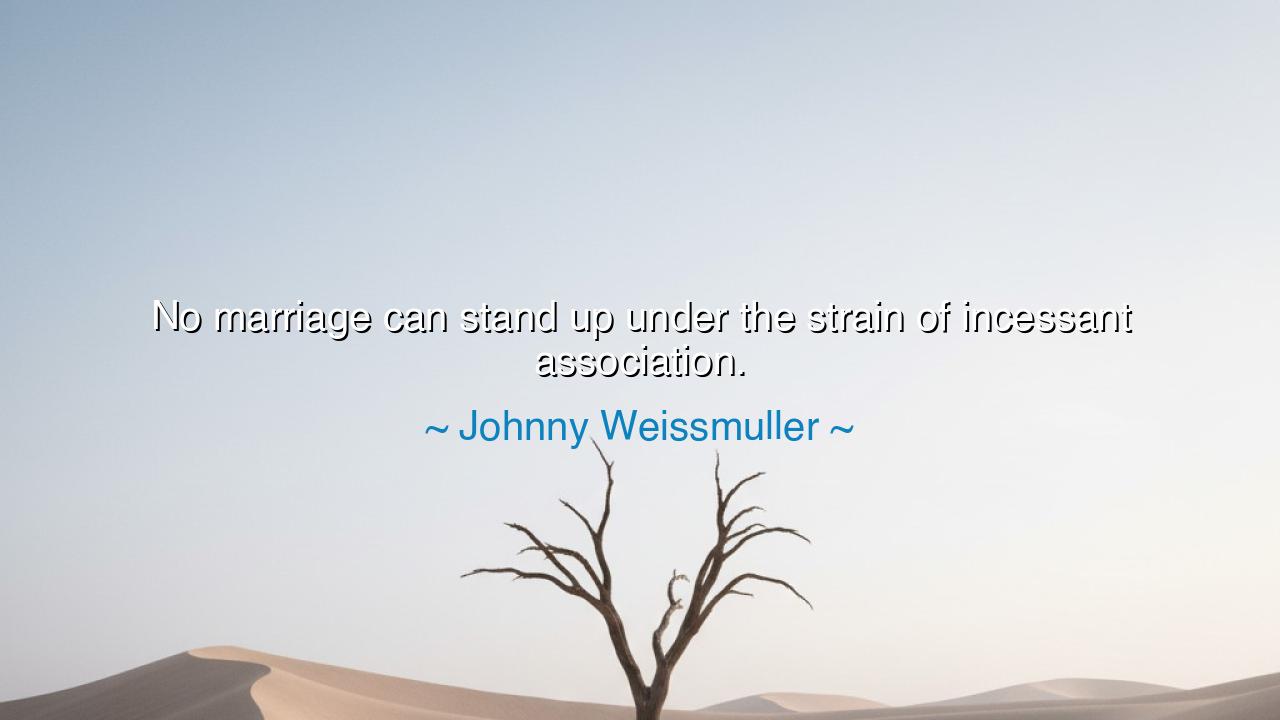
No marriage can stand up under the strain of incessant






Hear now the words of Johnny Weissmuller, the champion swimmer and famed portrayer of Tarzan, who once said: “No marriage can stand up under the strain of incessant association.” Beneath the simplicity of this statement lies a wisdom both ancient and eternal — a truth about love, space, and the fragile art of companionship. His words speak not in bitterness, but in understanding; for Weissmuller, who lived much of his life in the public eye and knew both triumph and heartbreak, understood that even love — that most divine of bonds — withers when it is deprived of air to breathe.
The origin of this quote rests in Weissmuller’s own life. Known to the world as the heroic Tarzan, he was not only a symbol of strength but also a man who endured the complexities of fame, relationships, and identity. He married multiple times, and through his experiences came to recognize a truth often forgotten by lovers: that constant togetherness, without respite or individuality, can erode even the deepest affection. To love someone is not to dissolve into them; it is to walk beside them while allowing each to remain whole. His reflection was born not of cynicism, but of experience — the kind of wisdom that grows only through both joy and sorrow.
To the ancients, this idea would not have seemed strange. In the teachings of Aristotle, there is the belief that friendship and love thrive best when partners share virtue and purpose — but also when they give each other the space to pursue their own good. Balance, they said, is the root of harmony; and when two souls spend every hour entangled, without solitude or renewal, the spirit tires. Even the gods, in their myths, often parted and reunited — for love, to endure, requires rhythm, not constancy. The sun and the moon, forever in motion, never meet yet always sustain one another’s light.
Weissmuller’s words, then, remind us that love cannot flourish without individuality. When two lives become one without distinction, they lose the very qualities that once drew them together. The fire of affection, starved of fresh air, grows dim. True marriage is not a chain but a dance — it requires closeness and distance, embrace and release. The ancients compared love to the harp: its strings must be tight enough to create harmony, but loose enough not to break. So too must partners learn to balance intimacy with independence.
Consider the story of Marcus Aurelius and his wife Faustina the Younger. Though emperor and empress, their union was not one of constant presence but of mutual trust. He often wrote of her with respect and affection, even while leading armies or tending to the affairs of Rome. Their marriage endured not because they were inseparable, but because they understood that love is sustained by trust, patience, and the freedom to breathe. In contrast, countless couples — whether rulers or commoners — have discovered that when every waking moment is shared without space, the heart grows weary, and affection turns to resentment.
There is also a psychological truth hidden within Weissmuller’s observation: the human soul needs solitude to renew itself. When life is shared too closely, friction arises not from hatred but from exhaustion. Even the most loving partners must sometimes retreat into silence — to think, to create, to rediscover the self that existed before the union. It is this returning to oneself that makes returning to the other possible. For only those who have their own life to bring can give love without depletion.
Let this, then, be the lesson handed down: closeness without space becomes confinement, and even the deepest affection must breathe. In all bonds — whether of marriage, friendship, or kinship — let there be time for solitude, for thought, for self-renewal. Do not fear distance, for it can strengthen love as the horizon strengthens the beauty of the rising sun. Learn to walk together, yet apart; to share your hearts, yet guard your individuality as sacred.
So remember the wisdom of Johnny Weissmuller: it is not the absence of love that destroys a marriage, but the absence of freedom within it. Let the wise, then, love not possessively, but generously. Cherish one another, yet grant each the gift of space. For love that breathes — love that trusts enough to let go — is the love that endures beyond the passing of years and the strain of incessant association.






AAdministratorAdministrator
Welcome, honored guests. Please leave a comment, we will respond soon